| Last visit was: 25 Apr 2024, 00:15 |
It is currently 25 Apr 2024, 00:15 |

Customized
for You
Track
Your Progress
Practice
Pays
| FROM Foster Admissions Blog: Foster Students Compete and Celebrate for Charity in Palo Alto |
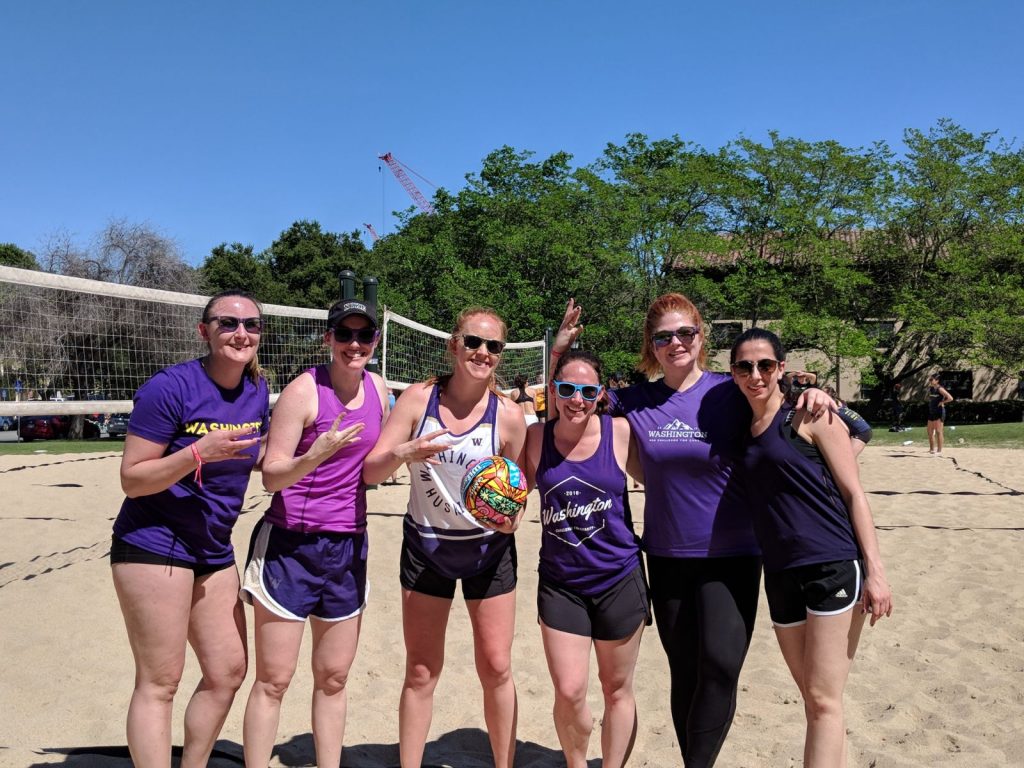 The 2018 Foster women’s volleyball team About the author: Mukund Rajasekhar is a first-year full-time MBA student at Foster. Every April, MBA students from 8 business schools on the West Coast make their way to Stanford to indulge in a weekend filled with sports, music, dance-offs and even a battle of the bands. But dig a little deeper and you see that each of these students has done their part in spreading goodwill in their communities. This weekend marks the culmination of an entire year of volunteering and fundraising across the coast and the students meet up to celebrate a year of giving back. Challenge for Charity, or C4C as it is fondly called, is a competition which has no losers. Students from the 8 schools volunteer thousands of hours and raise hundreds of thousands of dollars every year; with the winning school getting bragging rights and custody of the elusive Golden Briefcase for a year.  The 2018 Foster band This year, students from Foster pushed the limits and broke multiple records. We raised more money and volunteered more hours than ever before, and finished third overall in sports, our highest ranking yet. Unfortunately, this was not enough for us to retain the Golden Briefcase. 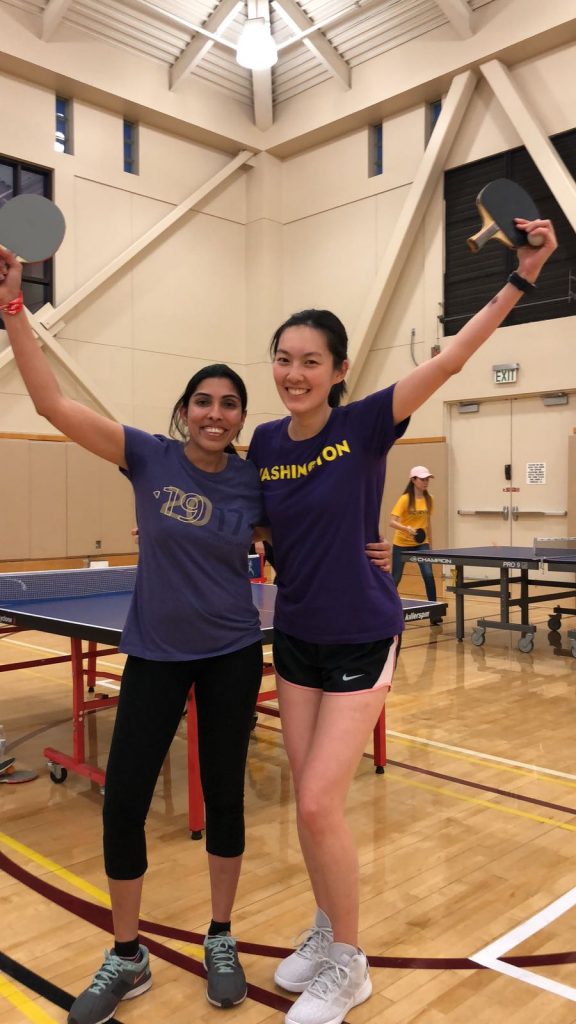 The Foster women’s table tennis team. C4C is taken very seriously at Foster and no one knows this better than the people leading the charge; our C4C presidents. As outgoing C4C presidents, Jenny Nowierski and Abby Schilbach have had the honor of winning the Golden briefcase in 2017. This is what Jenny has to say about C4C: C4C Sports Weekend is the best weekend of the school year. It gives you the unique opportunity to celebrate all the hard work we put into volunteering and fundraising for our amazing core charities while enjoying the beautiful weather and meeting new friends. I feel a true sense of pride cheering on our incredibly talented classmates as they compete in sports, and I’ve never felt more excited to be a Husky. We all work so hard throughout the year and this is the best way to celebrate our accomplishments. Finishing second this year was a hard pill to swallow but it has only fueled our quest to bring the Golden Briefcase back. This year, our campaign is being led by John Turk, Mallory Green and Monica Haggarty; and with the entire school behind them, it’s just a matter of time until the Golden Briefcase adorns the hallways of Paccar Hall once again. 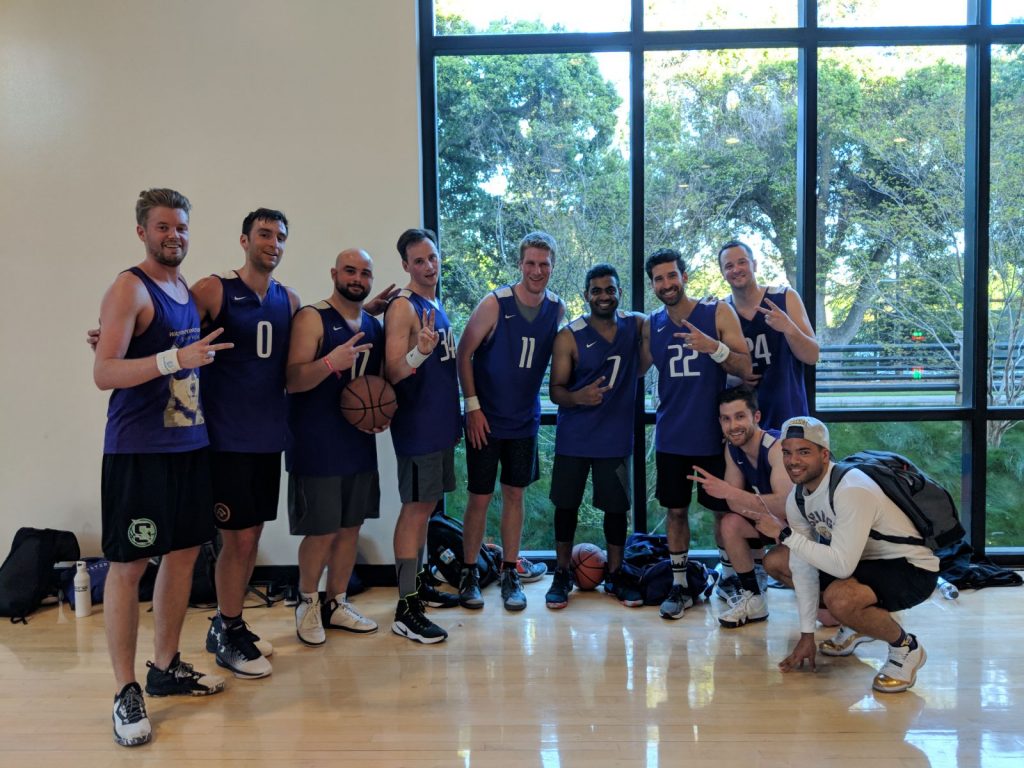 The Foster men’s basketball team. As John says, “C4C is a wonderful opportunity to compete in your favorite sports, cheer on your classmates, and have fun in Palo Alto! We are looking forward to another great weekend next year and to re-claiming the briefcase!” The post Foster Students Compete and Celebrate for Charity in Palo Alto appeared first on Foster Blog. |
| FROM Foster Admissions Blog: FOSTERing Community & Connections |
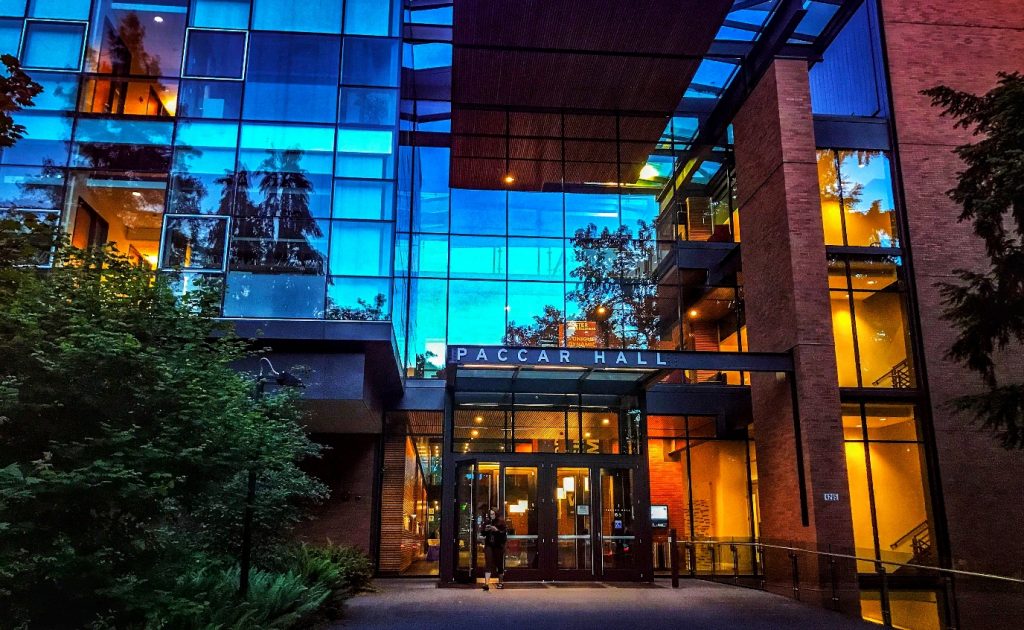 In April, in the midst of our spring welcome weekend, Foster hosted its first Alumni Diversity Dinner. The event — which was held in an intimate setting at the home of Melissa Uyesugi, Foster’s Associate Director of Diversity and Inclusion — welcomed 12 admitted students, 6 of their Blue Dots (Foster’s term for significant others), 6 Foster alumni, 4 current students, and 2 staff members. Compared to other MBA programs, Foster’s full-time class is on the smaller side, with around 100 students. But this gives the program a unique asset — a compelling sense of community. Providing a small space gave admitted students the opportunity to forge authentic connections with both current students and alumni, and allowed them to get a sense of how Foster views diversity.  In an effort to promote meaningful dialogue and connections, guests were given cups that featured fun conversation starters. There were also Jenga games that featured deeper get-to-know you questions on each piece. The alumni and students that attended found the event incredibly valuable. “It was really a pleasure to have the opportunity to connect with prospective students at the Diversity Dinner,” Jamie Young, President of Women in Business at Foster and full-time class of 2019, said. “Needless to say, I am impressed by their accomplishments and inspired by their stories.” “I loved the inaugural Diversity Dinner Event!” said Elisa Yuen, Senior Strategist at T-Mobile and Foster Class of 2017. “There are many Foster alumni and current students passionate about diversity. We come from different backgrounds and many of us enter different fields after graduation, but we’re united in continually striving to improve access and opportunities for underserved communities. It is always a great time catching up with those we know and building new connections with prospective students.”  In July, Foster will officially join the Consortium for Graduate Study in Management, an organization dedicated to promoting diversity and inclusion in business education, and more events related to these initiatives are planned over the coming months. Last November, Foster hosted a Fostering MBA Access event that featured prospective student visits, mentorship opportunities, and treks to several companies in the Seattle area. Foster plans to host a similar event this fall. Interested prospective students should complete this form to receive updates on upcoming events and opportunities to connect with Foster. The post FOSTERing Community & Connections appeared first on Foster Blog. |
| FROM Foster Admissions Blog: Foster MBAs and the Pacific Northwest |
One of the best things about attending Foster is you get access to everything that Seattle and Washington State has to offer. The #PNW ( Pacific Northwest) is peppered liberally on Instagram and is most common on posts involving people hiking, paddle boarding and enjoying everything outdoors.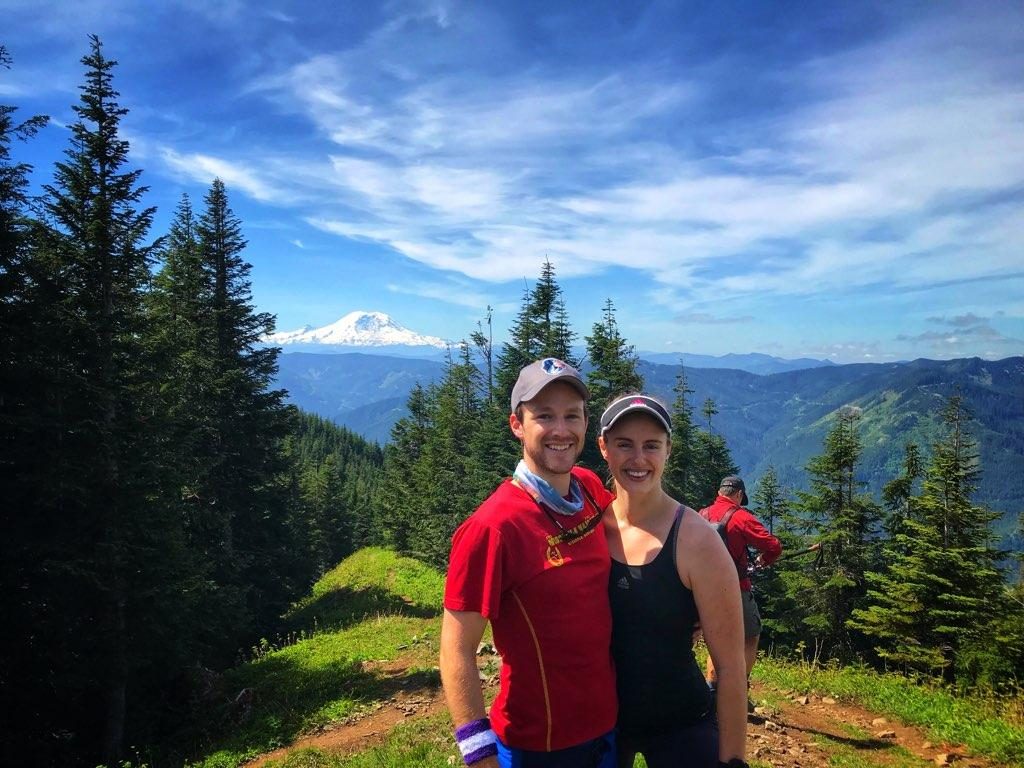 Class of 2019 student Marshelle Slayton and husband Trevor Bouten on Mount Washington Summers in Seattle are not to be missed, and Foster MBA students take full advantage of the gorgeous weather and the proximity we enjoy to many mountains and lakes. Many incoming students choose to spend their time in the weeks and possibly months leading up to business school taking advantage of everything this gorgeous state has to offer.  Class of 2019 Blue Dot Katherine Lane at Heather Lake The best part about living in Seattle is that you don’t need to travel far to get away from the hustle and bustle of the city. Looking for a relatively easy hike? Tiger Mountain is a 30-minute drive away. Feeling a bit more adventurous and want to challenge yourself? Mount Washington will greet you with a 4,000 feet elevation gain that has to be scaled in less than 4 miles! And it’s only an hour away from the city which means you get back that much sooner to rest those sore muscles. If hiking is not your thing, you can always take a ferry to the San Juan Islands to indulge in some paddle boarding, camping or just lay in a hammock and take in some gorgeous sunsets.  Class of 2019 student Loris Zarzar on the Mount Washington trail Let’s not forget the group of Foster MBA students who attempt to summit Mount Rainier, the tallest peak in Washington, every year! This year the summit was successfully attempted by 10 students from the class of 2018 and 2019, and the climb was the culmination of a year of intense training and preparation. I was assured that the pictures below don’t do justice to the actual views from the top. Not many men and women can boast of walking on land higher than the clouds, and these students earned it!  Class of 2019 student Levi Zurbrugg on Mount Rainier As you can see, Seattle and Washington have a lot to offer the outdoor junkie. Pack those bags! The PNW is waiting for you! 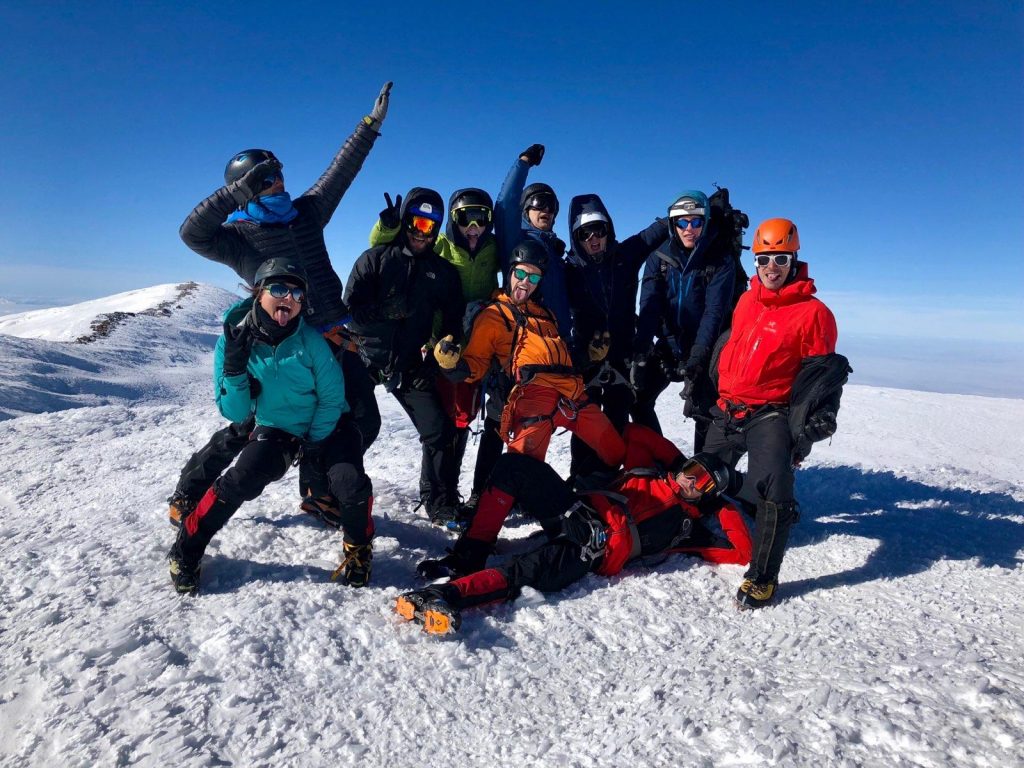 MBAs from the class of 2018 and 2019 on the summit of Mount Rainier The post Foster MBAs and the Pacific Northwest appeared first on Foster Blog. |
| FROM Foster Admissions Blog: Applied Strategy Projects at Foster |
|
As part of the Foster curriculum, every full-time MBA student participates in a consulting project during winter quarter. This academic course, called Applied Strategy, pairs teams of students with companies to solve complex business problems. Applied Strategy projects provide students an opportunity to apply classroom concepts in a real business scenario and get a feel for what to expect in their future internships and careers. Many students use the MBA to pivot their careers, and Applied Strategy projects allow students to explore different roles and functions in a controlled academic environment. Projects span a variety of industries and include but are not limited to projects in strategy, marketing, finance, and operations management. My team worked with Google on a project relating to the marketing landscape in the technology space. Since all the students on my team signed NDAs prior to working on this topic, I can’t share too many project specifics. Over the course of 10 weeks my team researched the technology advertising landscape, identified industry best practices and examples, and ultimately provided Google with a set of strategic recommendations. What surprised me the most, in a good way, was how the experience was so much more than a marketing project. Through the project I got to wear many hats; from consulting, when we were researching, digging for data and providing recommendations; to operations when we went about planning the project timeline and deliverables. One of the more challenging aspects of this experience was scoping the project and deliverables. It would have been very easy for us to fall down a rabbit hole and lose sight of the bigger picture. The experience proved to be a tremendous learning opportunity and I learned to prioritize and execute on the fly, a skill that I have used both at school and in my summer internship at Amazon. From gentle nudges that instigated thought-provoking discussions amongst the team, to the timely feedback that ensured our team was on track, the Google project sponsors were very involved and made it an extremely enriching and educational experience. I truly gained insight into how a company like Google approaches problems. 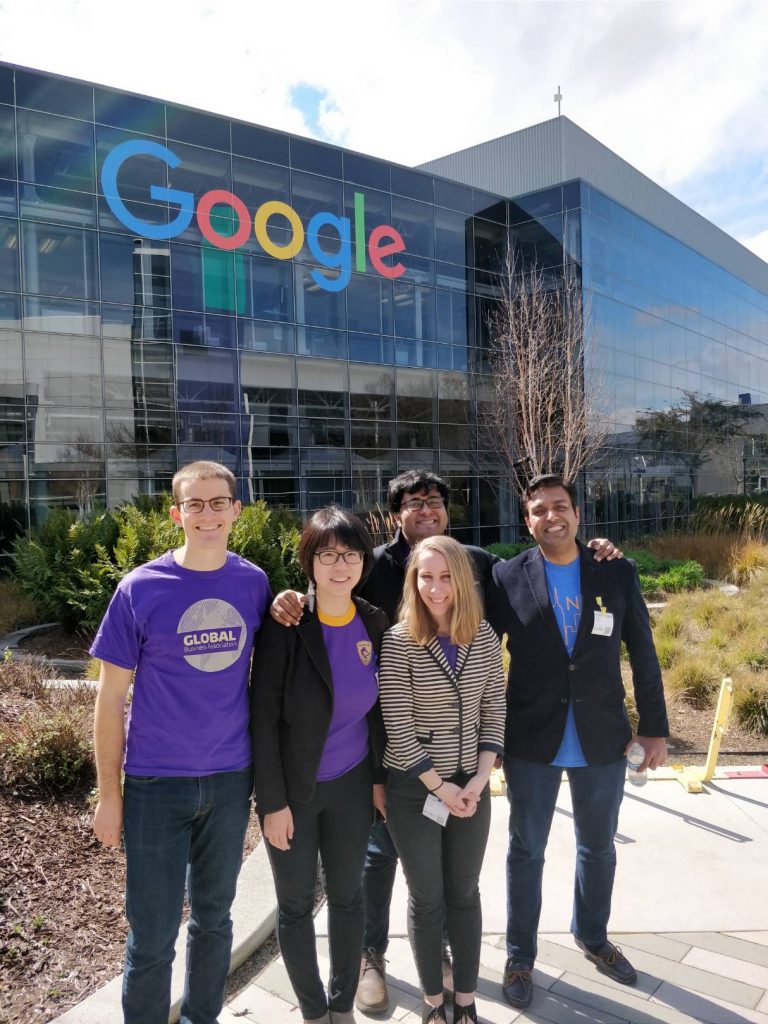 Applied Strategy can prove hugely impactful to a student’s MBA journey; from finding great mentors to using it as a platform to network and grow as a student and a leader. My classmate, Tim Luk, says ”My Applied Strategy project was the most valuable experience I’ve had at Foster thus far. As someone trying to transition into the tech industry with no prior tech experience, it was a great way to gain relevant experience. My team hit the ground running and was able to impress our sponsor with the depth of our recommendations.” Another classmate, Jamie Young, had this to say about her experience “During my summer internship, I’ve drawn on many learnings from my Applied Strategy project. It’s been immensely helpful to draw on the experience of taking an open-ended problem, researching, applying frameworks and developing a recommendation. The project was a great application for balancing the revenue goals of the client, the price sensitivity of the customer, and the value perceived by the end customer. “ The post Applied Strategy Projects at Foster appeared first on Foster Blog. |
| FROM Foster Admissions Blog: Applied Strategy Projects at Foster |
|
As part of the Foster curriculum, every full-time MBA student participates in a consulting project during winter quarter. This academic course, called Applied Strategy, pairs teams of students with companies to solve complex business problems. Applied Strategy projects provide students an opportunity to apply classroom concepts in a real business scenario and get a feel for what to expect in their future internships and careers. Many students use the MBA to pivot their careers, and Applied Strategy projects allow students to explore different roles and functions in a controlled academic environment. Projects span a variety of industries and include but are not limited to projects in strategy, marketing, finance, and operations management. My team worked with Google on a project relating to the marketing landscape in the technology space. Since all the students on my team signed NDAs prior to working on this topic, I can’t share too many project specifics. Over the course of 10 weeks my team researched the technology advertising landscape, identified industry best practices and examples, and ultimately provided Google with a set of strategic recommendations. What surprised me the most, in a good way, was how the experience was so much more than a marketing project. Through the project I got to wear many hats; from consulting, when we were researching, digging for data and providing recommendations; to operations when we went about planning the project timeline and deliverables. One of the more challenging aspects of this experience was scoping the project and deliverables. It would have been very easy for us to fall down a rabbit hole and lose sight of the bigger picture. The experience proved to be a tremendous learning opportunity and I learned to prioritize and execute on the fly, a skill that I have used both at school and in my summer internship at Amazon. From gentle nudges that instigated thought-provoking discussions amongst the team, to the timely feedback that ensured our team was on track, the Google project sponsors were very involved and made it an extremely enriching and educational experience. I truly gained insight into how a company like Google approaches problems.  Applied Strategy can prove hugely impactful to a student’s MBA journey; from finding great mentors to using it as a platform to network and grow as a student and a leader. My classmate, Tim Luk, says ”My Applied Strategy project was the most valuable experience I’ve had at Foster thus far. As someone trying to transition into the tech industry with no prior tech experience, it was a great way to gain relevant experience. My team hit the ground running and was able to impress our sponsor with the depth of our recommendations.” Another classmate, Jamie Young, had this to say about her experience “During my summer internship, I’ve drawn on many learnings from my Applied Strategy project. It’s been immensely helpful to draw on the experience of taking an open-ended problem, researching, applying frameworks and developing a recommendation. The project was a great application for balancing the revenue goals of the client, the price sensitivity of the customer, and the value perceived by the end customer. “ The post Applied Strategy Projects at Foster appeared first on Foster Blog. |
| FROM Foster Admissions Blog: Conquering the Summer:Foster MBA Interns |
|
Summer internships mark the all-important transition from the first year to the second year of the MBA and give students a chance to use all the new skills they have accumulated in their business “toolbox” over the first year of the MBA. As always, Foster MBAs this year made their way into some of the biggest and most prestigious companies across America. Preparations for summer internships start as early as Autumn quarter with Foster students engaging in networking and case preparations for consulting internship opportunities, which are the first to arrive on campus. Networking, a term synonymous with every MBA, is a great way to learn about various roles and organizations. With plenty of supportive Foster alumni present in the Seattle area, a friendly coffee chat is just an email away. Consulting internships offer students a great chance to experience the breadth of an industry and pick up critical technical and interpersonal skills. 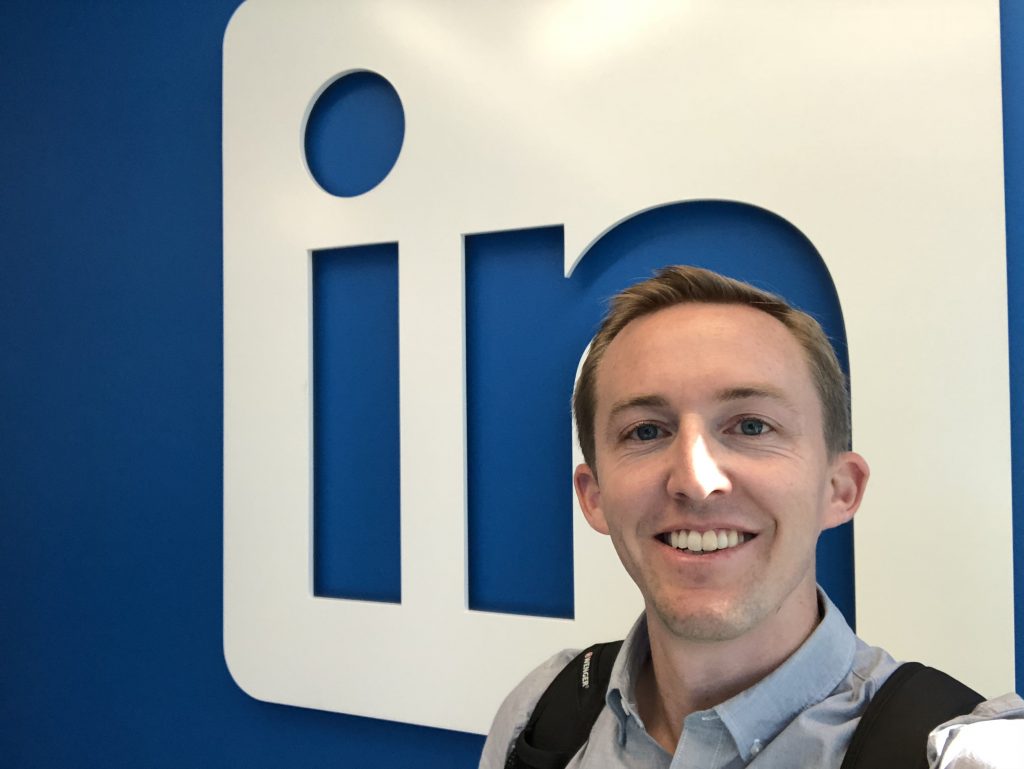 As Gina Johnson (MBA 2019) says “I was an operations improvement consultant intern at ECG, a management consulting firm specializing in provider side healthcare. I got to work on eight different client projects this summer, giving me opportunities to apply lots of new MBA skills I learned in the first year, learn more about different aspects of the healthcare industry I hadn’t previously been exposed to, and see firsthand what a career in consulting could be like!” However, some Foster MBAs don’t get to experience the beautiful Seattle summer because they find themselves solving challenging business problems in different parts of the country. From Samsung in New York to Facebook and Dell in Austin and LinkedIn in the Bay area; Foster MBAs affect change, coast to coast. Andrew Caponi (MBA 2019) was a product manager at Facebook’s Austin office this summer, and he was able to soak up some sun and drive tangible impact for the social networking giant. As Andrew says “This summer, I worked on Facebook’s Risk and Payments team providing analytical support to product managers. After gaining an understanding of the business, I created a product health monitoring framework and build a real-time tool that provided managers with quantitative guidance on where to invest in product quality and integrity as they scale. I thoroughly enjoyed my time at Facebook and was very appreciative of the resources they provided me which allowed me to make an impact in a relatively short period of time. “ 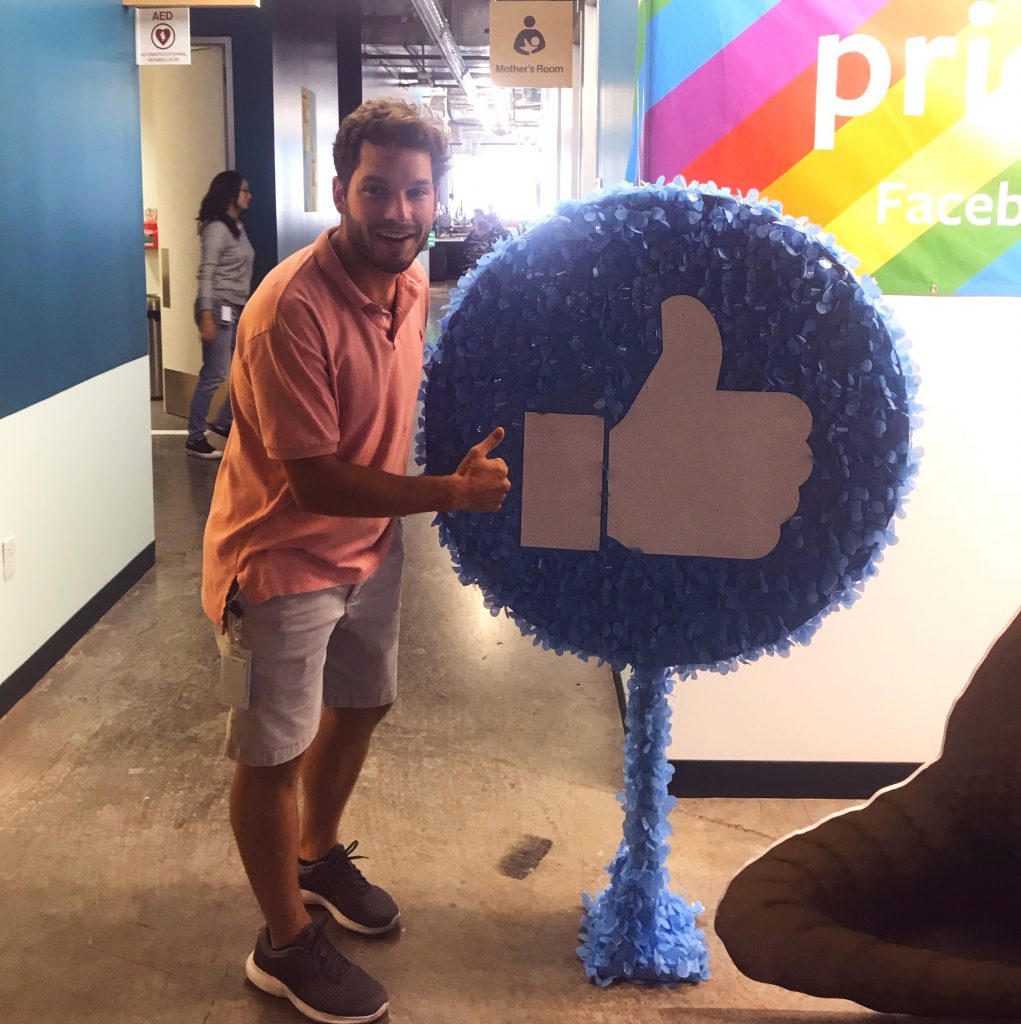 Another power team that made way out of Seattle for the summer was David Cone and Catherine La Plant who made sure Intel’s finance team had access to some sharp business minds for the summer. Talking about his experience at Intel in Portland, David (MBA 2019) says” This summer I spent my time learning what it means to be a finance professional at Intel. Over the course of my internship, I had the opportunity to use the skills I learned in my classes and test out my career switch from information technology to finance. Although I was nervous about such a big switch, I was able to lean heavily on a fellow classmate, Catherine LaPlant, that also interned at Intel. Overall I had a great experience and would highly recommend Intel for future MBA students at Foster.” 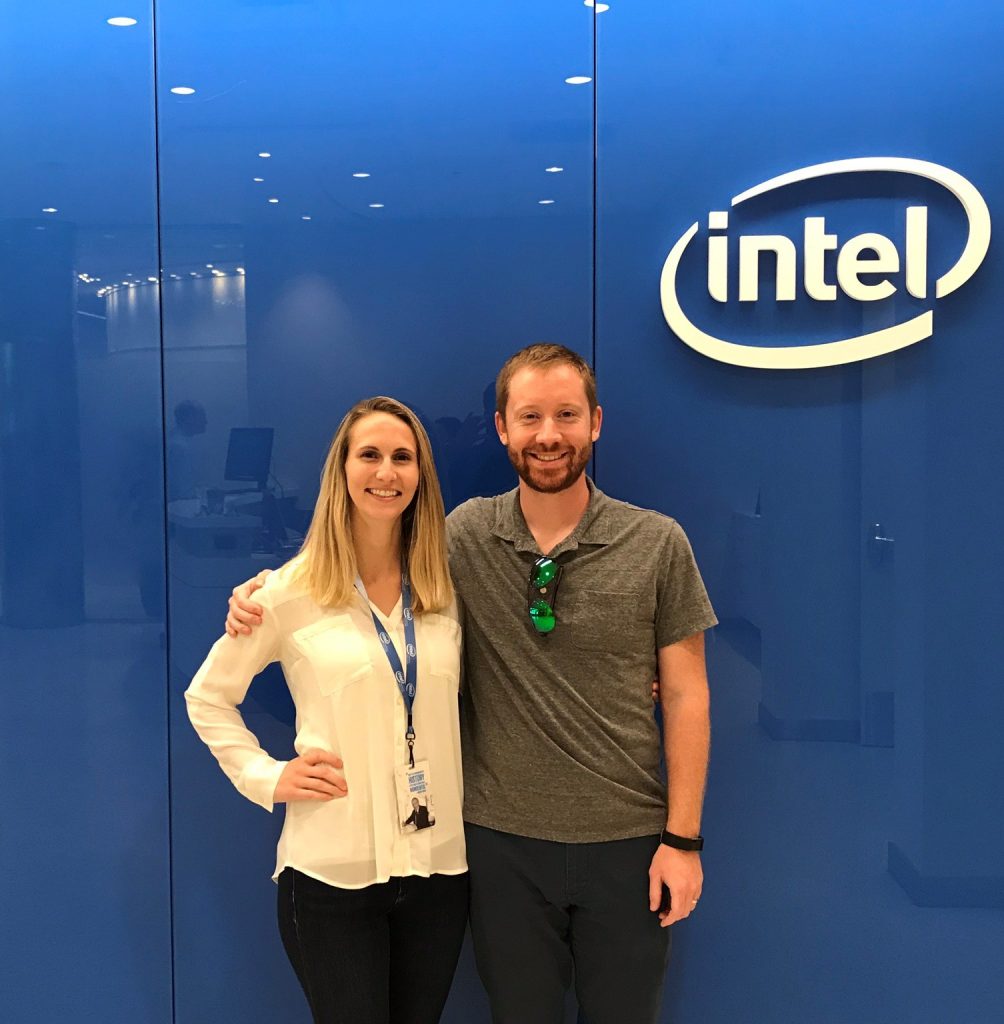 Summer internships during your MBA are a great way to learn new skills, put your knowledge to the test and explore roles and industries that may be of potential interest to you. The staff and faculty at Foster, current students, and the alumni across the globe will help ensure that you have a summer experience that is not only fulfilling but also filled with fond memories that you can bring back to your second year of B-School. The post Conquering the Summer:Foster MBA Interns appeared first on Foster Blog. |
| FROM Foster Admissions Blog: Work-life Balance Strategies from Foster MBA Moms and Dads |
|
Parenting while in school comes with its own set of challenges, but careful planning and supportive team members make all the difference. Business school is often described as one of the most fun and challenging two years one can experience during their career. Between team meetings, assignments, exams and even the weekly happy hour fun; there is always a lot going on to keep students on their toes. Throw in an additional diaper change routine, and you are now living the dual life of B-school student and full-time parent. The class of 2019 has its fair share of parents who crunch balance sheet numbers in the classroom and go home to be real-life superheroes for their kids. As Bryan Young says “Being a parent in business school is tough, but so worth it! Throughout my time at Foster, I have had to prioritize my family over social events, but it has never felt like I am missing out. We have developed a parent and kids’ room during our monthly TG (big party) where parents can hang out together and have a drink while their kids watch a movie or work on a craft. It will all be more than worth it to have my kids cheer for me when I get to go across the stage during graduation. “ 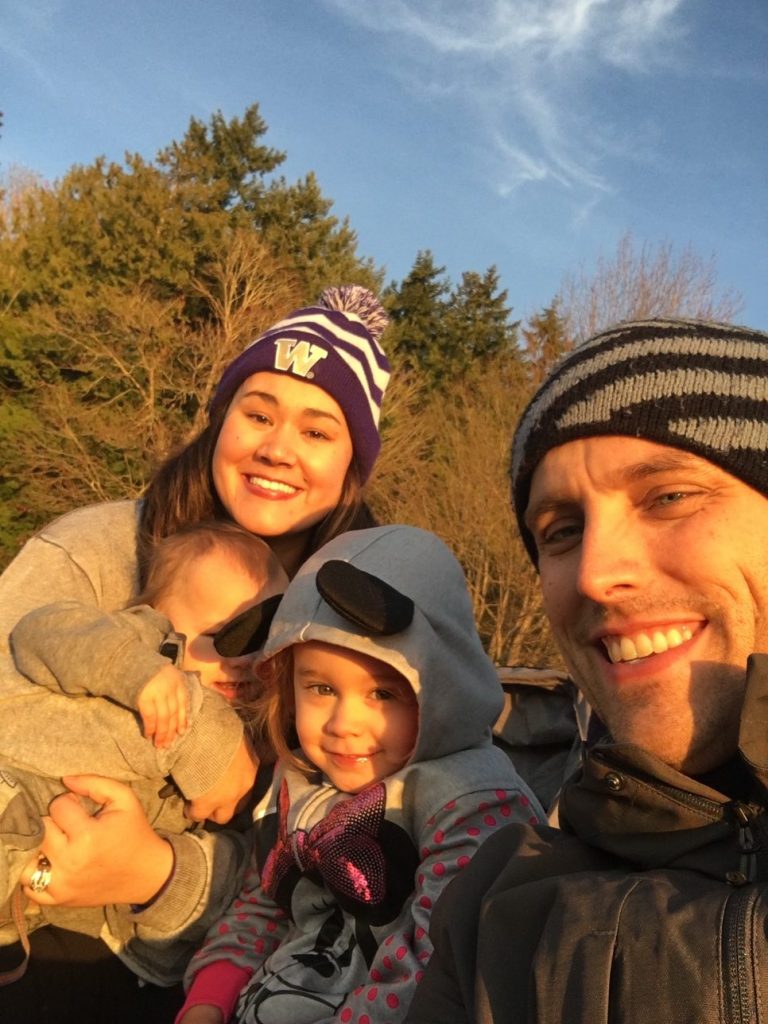 Bryan Young and his family Priya Gupta says” Living the life of a fulltime B-school student and parent is always challenging. However, in this journey, I have been able to identify a few key strategies that have helped me get the most out of my MBA and fulfill my duties as a parent. One of the most important things I did at the start of the year was to set my priorities and decide not to have any regrets. At B-school, there are always more things to do than humanly possible, and therefore, it is important to prioritize things and manage time effectively. Finally, I was pleasantly surprised by the cooperation I received from my peers. I have received help and support, sometimes even before I asked for it, and I am really grateful to my peers for that.”  Priya Gupta and her daughter Tanya The kids’ room at the TG is definitely a hit with kids and parents alike, and it’s common for fellow Foster students to volunteer to spend time with their classmates’ kids by conducting activities.One of the new entrants to the parent circle is first-time parent Graham Bullis who became a father at the end of the first year of his MBA. Graham Bullis says” Since school has started back up, the balance lies between being home and social life. During the first year of the MBA I was able to say yes to all kinds of events that the program offered, but now I trade those experiences for time at home. Sometimes the FOMO hits hard, so I delete Instagram from my phone, so I can’t see the fun being had. Other times I remember there are way too many opportunities for us and you’ll always miss out on something. Being the newest parent of our class, I am extremely impressed with the other parents that are able to manage and balance all the priorities. It is a steep learning curve for me right now, but I’m loving the process. The truth is, none of my MBA experiences are possible without my wife supporting me and putting forth tremendous effort to raise our son while I attempt to learn finance and big data.”  Graham Bullis’s son Charlie Yasar Ammar says ”Managing first year of B-School with our five-year-old daughter was not easy. Life was tough. But thanks to my wife’s support and my classmates’ understanding, I was able to manage both my responsibilities as a student and as a parent. My team-mates were always happy to accommodate my request for joining meetings remotely, whenever possible. That enabled me to devote more time to my family while also contributing to team deliverables. Values like empathy, understanding, support, and compassion are at the core of Foster’s culture – values which distinguish us as a great school and as a community of friends.” With meticulous calendar planning, supportive classmates and timely hugs and kisses from their little ones; parents at Foster can maximize their MBA experience. They get to prepare for their post MBA career with confidence and honestly believe that they will be able to succeed in a new role while prioritizing their most precious responsibilities. The post Work-life Balance Strategies from Foster MBA Moms and Dads appeared first on Foster Blog. |
| FROM Foster Admissions Blog: Building careers, teams, and friendships: Q&A with Juan Weiser, MBA 2019 |
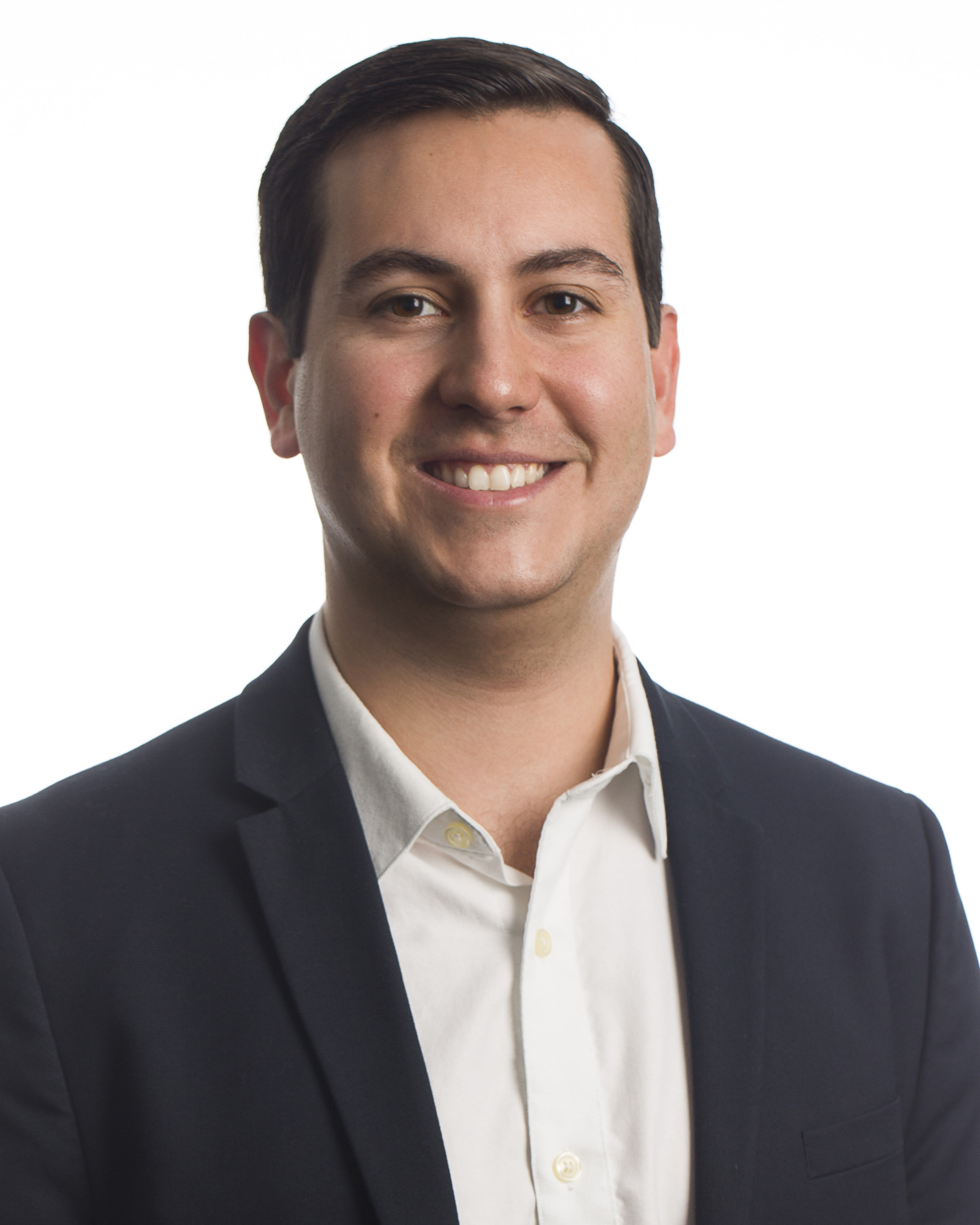 Why did you choose the Full-time MBA program at the UW Foster School of Business? I chose the FT MBA program at Foster because of a combination of three factors: the rising of Foster in the rankings, the small size class and community environment, and finally the tech companies and job opportunities in Seattle. Prior to my MBA I was working in management consulting in Mexico. This helped me develop a good business knowledge base, but I also identified that I had gaps in some functional areas and in my leadership skills. Also, I wanted to immerse myself in the technology industry and pursue a career in a tech company. Finally, Foster offered all these components that will enable me to grow professionally plus enjoy two years in a very exciting city, surrounded by all the beauty that the Pacific Northwest has to offer. Student Experience What has been the highlight of your Foster MBA experience so far? A highlight from my Foster MBA Experience was getting involved in Foster’s Challenge for Charity. C4C is an organization that organizes a competition for volunteering, fundraising and sports, among MBA programs in the west coast. During my two years at Foster I was part of the Board and I had the opportunity to work with an amazing team organizing volunteering activities and our annual alumni auction. C4C has been an amazing opportunity to balance my time between school, social activities and spending time giving back to the community. Finally, every year, C4C ends with Sports Weekend at Stanford, where you get to play sports with MBA students from other schools and be rewarded after all the effort done throughout the year. Curriculum Describe your internship experience. During the summer I had the opportunity to do my internship with Dell Technologies in Austin, TX. I joined the LatAm marketing team. The skills developed during my first MBA year combined with being from Venezuela and having prior work experience in Latin America, put me in a path to success during those 12 weeks of internship and eventually converting into a Full-Time role. This opportunity aligned perfectly with one of my MBA goals, which was to build a career in the Tech Industry. In 12 weeks I had a lot of exposure to technical knowledge, understanding the consultative selling process used by Dell and finally developing a marketing strategy that would be executed by the team in following months. Besides your internship, have you participated in any experiential learning opportunities? During spring break of my 2nd year I participated in the India Consulting project. This is a 2-week program in which a group of 15 students traveled to India a to work with SEWA, an organization that helps self-employed women in India. During our two weeks in India we had the opportunity to get immersed in the culture, but mostly applied frameworks and skills learned in class with a hands-on approach. This experience greatly contributed to my education because it gave me a new perspective on business culture. Faculty Is there a faculty member who stands out in your mind as being exceptional? For me it’s Jennifer Koski, she taught Problems in Business Finance, which was a finance elective. Her class was completely case based; I was amazed at how she was able to structure the class discussions and challenge every one of the students to understand what the finance situation in question was. At the same time, she was able to connect all the other functional areas to show how this have a financial impact in the business. Also, Jennifer was our faculty advisor for the India Consulting Project, her guidance helped us to develop the best solution for SEWA and to enhance our applied learning process. Career Impact What are you planning to pursue post MBA? Post MBA I joined Dell for a two-year marketing rotation program. I believe Foster has helped me develop a holistic framework to identify and solve business problems. This combined with leadership skills and a tool set of marketing frameworks will help me succeed in my career in Dell. Work / Life / School Balance What’s the most challenging part of the MBA? A big part of the MBA experience is self-reflecting, figuring out what you want to do post-MBA, what business area or industry you are interested in, among many other things. In my case, I loved every part of the MBA because it has opened doors to learn and explore a lot of new things, but it also comes with great challenges. Time is your biggest constraint in an MBA; therefore, prioritizing is crucial along with accepting the fact that you can’t do it all. You need to find a balance among all the possibilities available to be able to maximize the MBA experience. Social Life Are you involved with any social or recreational clubs? As a Latino, I consider myself a very outgoing and social person, that is why I was pretty much involved in every recreational club. I went to every TG (MBA organized parties), I was a board member of Huddle (Football tailgate organizing club), a was pub club president, and I was also part of the C4C board. All of these activities can give you the opportunity to interact with your classmates and blue dots outside of the classroom or team setting. It’s the perfect setting to decompress from the academic stress and to build very strong friendships that will last forever. Seattle What are your overall impressions of the Seattle? Seattle is a great city that combines all the perks from a city with all the perks from the nature. Seattle has great bars, restaurants, breweries, live music and much more. On the other hand, it has Rainier and its surrounding mountains and lakes, which provides one of the best playgrounds for hiking, kayaking, skiing and many more outdoor activities. The only constraint is the rain, but at some point you just live with it and it does not bothers any more. The post Building careers, teams, and friendships: Q&A with Juan Weiser, MBA 2019 appeared first on Foster Blog. |
| FROM Foster Admissions Blog: Foster Alumni Recognized in 2019 PSBJ 40 Under 40 |
|
Congratulations to Lian Carl (MBA 2010), Vanessa Brewster Laughlin (MBA 2007) and Joe Trieu (BA 2007) for being recognized by The Puget Sound Business Journal as 2019 40 Under 40 honorees. Launched in 1999, the Journal’s 40 Under 40 recognizes “leaders in the region who are making major strides in their career while leaving a positive impact and helping shape the Puget Sound region.” The list of the business community’s best and brightest young leaders has included a host of UW Foster grads since its inception and this year continues the trend. 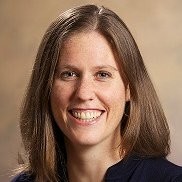 Lian Carl An Evening MBA Program graduate, Lian Carl is currently VP of Product for Ookla, a global leader in mobile and broadband network intelligence, testing applications and technology, known popularly for their Speedtest software. Prior to joining the tech arena, Carl served as Director of the Landesa Center for Women’s Land Rights. A Double Dawg, she earned her BA in Political Science from UW in 2002. 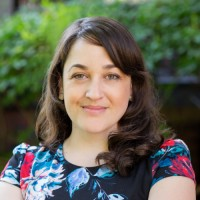 Vanessa Brewster Laughlin In early 2018, Vanessa Brewster Laughlin left a career in management consulting to focus on the launch of Banister Advisors, which offers its clients healthcare navigation, bereavement and estate services. The concept for the company was inspired in large part by the 2016 death of the Laughlin’s father-in-law, Jay Banister Laughlin, MSW, after an unexpected health crisis. She received her BA in Economics from Tufts University. 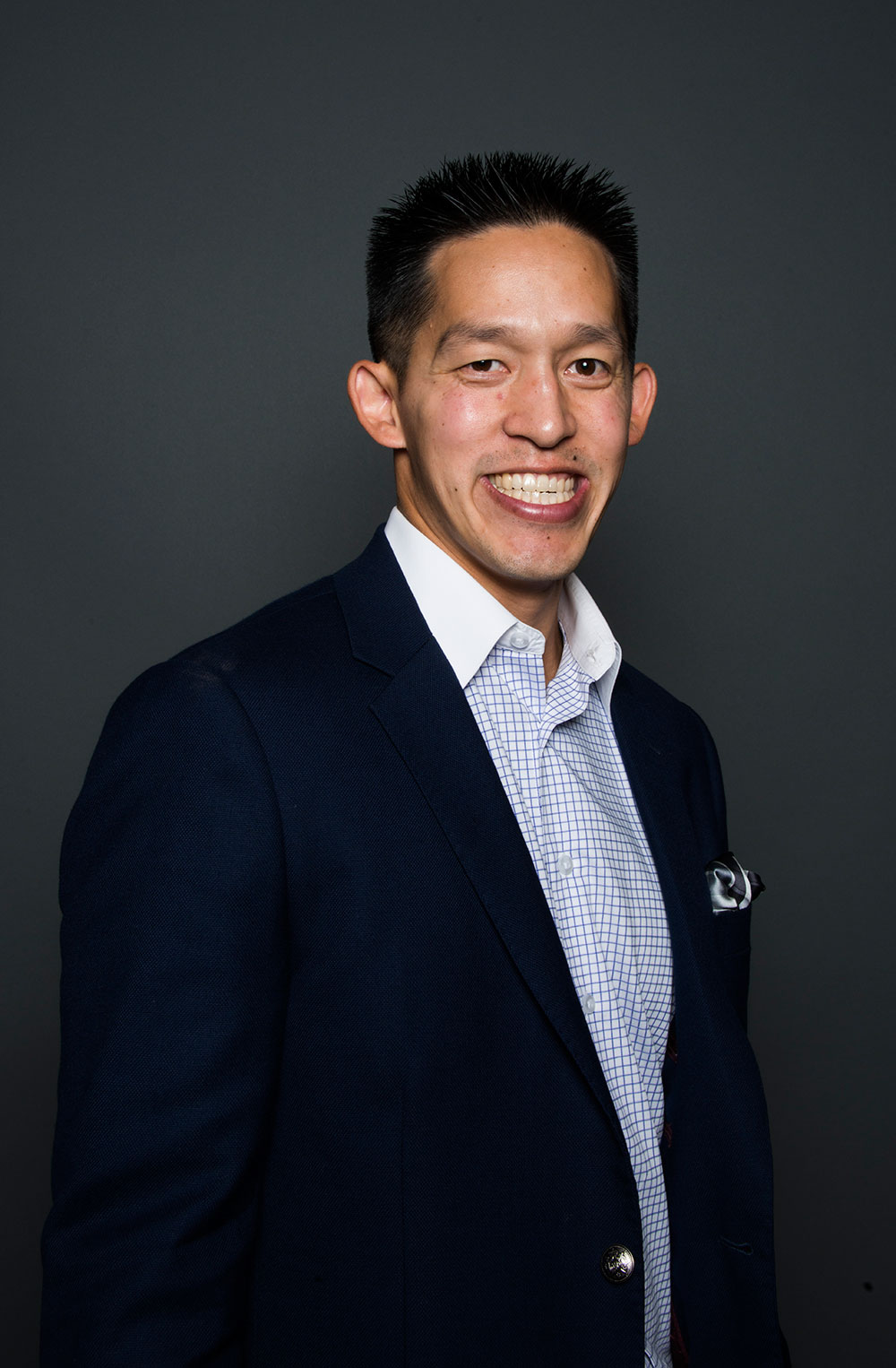 Joe Trieu Joe Trieu, who earned his BA in Business Administration from the Foster School, is a second-generation owner of Evergreen Beauty College. He took over as president of the company in 2010 and has grown it from a staff of 6 to the largest beauty school in the state. Along the way, Trieu has also championed a workplace culture which has placed Evergreen Beauty College on the Seattle Business list of “Washington’s 100 Best Companies to Work For” six years running. Each the honorees will be profiled in the September 27th edition of the paper and honored at the Journal’s luncheon on the same date. The post Foster Alumni Recognized in 2019 PSBJ 40 Under 40 appeared first on Foster Blog. |
| FROM Foster Admissions Blog: Foster moves up 7 spots to #23 in Forbes Best Business Schools Ranking |
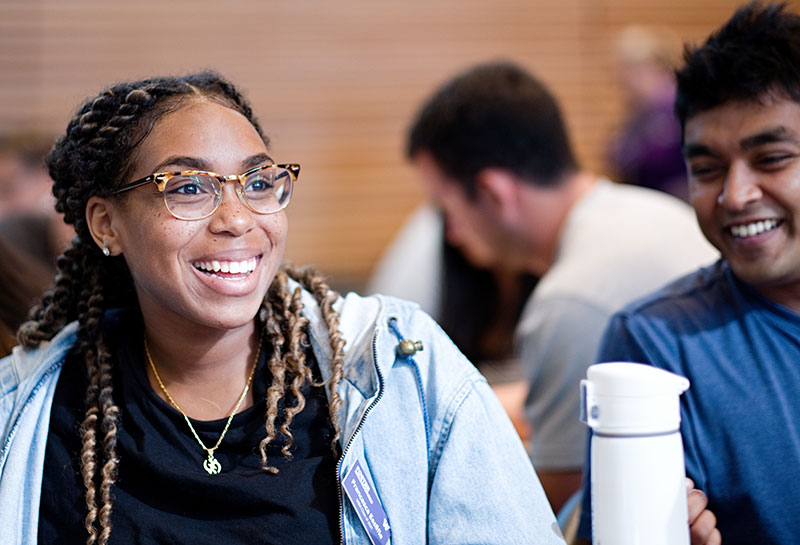 Known for its high MBA salaries and affordable tuition, the Foster School of Business ranked #23 among the Forbes Best Business Schools for return on investment. Foster was notable among the top 25 schools for fast ROI (just 3.8 years to pay off the degree) and reported the second-lowest tuition. Forbes examined more than 100 schools and reached out to 17,500 alumni worldwide. Just 61 schools in the U.S. were ranked. $95,000 increase in Foster MBAs’ average salary 5 years after graduation Foster graduates who started the program with an average $70,000 salary reported an average salary of $165,000 five years later. Forbes reports, “Our survey of alumni indicates that a degree at a leading business school is still incredibly valuable and pays for itself in roughly four years.” Across all programs, earnings increased 10% annually since graduation. Forbes rankings are based on the career outcomes of the class of 2014. More recent Foster MBA graduates have benefited from increasing job placement rates (99.1%) and rising salaries (average salary and bonus of $147,763). According to incoming assistant dean for MBA Programs, Wendy Guild, “Foster has continued to execute on a market-oriented strategy of aligning our programs with the needs of employers, drawing and retaining world-class faculty and staff, and investing in a best-in-class professional development program. This has attracted excellent students who go on to perform well at key employers. These employers, in turn, continue to seek out our students and provide competitive compensation packages.” Average debt not factored into ROI calculations While Forbes’ ROI formula includes an adjustment for cost of living during MBA study, it does not account for the burden of student debt that takes graduates many years to pay off. The ROI ranking uses a methodology to calculate 5-year gain that subtracts tuition, fees, and foregone earnings from 5-year total compensation. According to Forbes alumni surveys, the median debt load across MBA programs was $80,000. Of the Forbes ranked business schools that provided average debt data to U.S. News & World Report, there were only five schools in the Forbes top 25 with average debt loads below $90,000. The epic climb continues Poets and Quants recognized Foster among the schools with the highest ascension in the Forbes Rankings on the basis of the school’s 7 spot improvement from the previous ranking. Since 2003, Foster has moved up in the Forbes Best Business Schools Ranking from 49 to 23. This mirrors Foster’s astonishing rise of more than 94 spots across U.S. News and World Report, Bloomberg Businessweek, and The Financial Times since the year 2000. What has fueled this epic climb? The learning experience, faculty, and culture of the school are all integral to Foster’s success attracting top students and employers. According to Bloomberg Businessweek, Foster ranks #17 in networking and #20 for its learning experience. Faculty research productivity ranks #7 in the world in The Financial Times. Those measures and more can be used to compare schools in the MBA Rankings Calculator. Learn more about the Foster Full-time MBA Program and MBA Career Opportunities. Related stories: Foster #1 of MBAs with highest return for grads earning $100,000+ Foster tops elite schools with 99% job placement, moves to #21 in U.S. News MBA ranking Foster Enters Top 10 for Total MBA Earnings The post Foster moves up 7 spots to #23 in Forbes Best Business Schools Ranking appeared first on Foster Blog. |
| FROM Foster Admissions Blog: Once an Entrepreneur, Always an Entrepreneur: How Master of Science in Entrepreneurship Alum Andrew Jung came to Found DuJour and GrillMe |
Andrew Jung is the Co-Founder of the on-demand turned full-time hiring restaurant labor platform DuJour. An alumnus (’19) of the Master of Science in Entrepreneurship program, we recently got the chance to catch up with Andrew on a sunny day at his co-working space in Columbia Tower Club. We discussed how he first landed on the entrepreneurial path, his deviation from the “normal” working world, and how the MS in Entrepreneurship program played a key role in the launch of his second company, DuJour.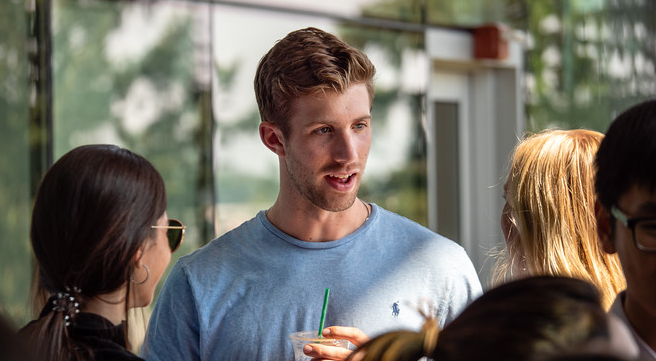 A Sick Spell with an Unlikely Outcome Andrew Jung never intended to enter the foodservice startup business—but then again, he also never intended to contract mononucleosis (“mono”) during his senior year of college. It was this opportune malady that jumpstarted Andrew’s career in entrepreneurship. Any young adult afflicted with the misfortune of enduring mono knows that leaving the confines of a bed, much less leaving one’s living quarters to get food, is a near-impossible task. When Andrew found himself in this situation, he refused to let it stop him. Reframing this circumstance as a potential opening for a business venture, he decided to create a food delivery service app (now named GrillMe) that would allow him to virtually order his favorite fare and have it delivered to the entrance of his dorm room. The Return to Entrepreneurial Roots After graduating from Middlebury College with a dual degree in Economics and Computer Science in 2016, Andrew made the transition into a seemingly ideal job as a Financial Analyst at J.P. Morgan, which he had lined up prior to leaving his undergraduate studies. Almost two years went by before Andrew realized it wasn’t the right place for him. He soon learned of the newly introduced MS in Entrepreneurship program and was intrigued. The entrepreneurial spark that had started in college was still alive, leading him to think this could be a great opportunity to dive all-in to entrepreneurship and grow his budding business skills. So, Andrew decided to go for it. His college side-hustle, GrillMe, was (and still is, but under different ownership) going strong, but he didn’t necessarily look at the Entrepreneurship program as solely a tool to grow the company. In fact, between the time he had applied to and started the MS in Entrepreneurship in summer of 2018, Andrew had an entirely new idea. He steadily turned the prospect into DuJour, ultimately deciding to sell GrillMe during this period. Today, Andrew can be found high up in the handsome working quarters of the iconic Seattle high rise, where he leads operations of the restaurant service and labor-matching company he founded in August of 2018, called DuJour, Inc. 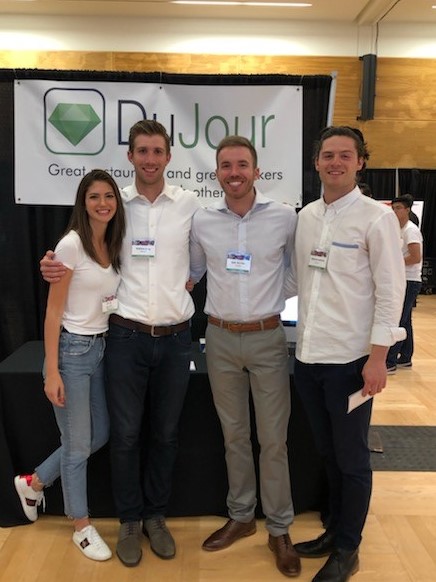 DuJour is an evolving labor-matching platform which currently serves as a liaison between local restaurants seeking labor and food service workers seeking employment. After learning more about the intricacies of the foodservice industry through founding GrillMe, Andrew discovered that he wanted to explore another opportunity for improvement within this space. “Employment and workforce issues are a lot more interesting to me because it presents a much bigger problem to restaurants,” he said, reflecting on how the ever-growing restaurant industry is going to have an increasingly larger role in society as people come to lead busier and busier lives. Leading as an MS in Entrepreneurship Student Andrew says the MS in Entrepreneurship was not only instrumental in teaching him technical business skills, like pitching an idea and go-to-market strategies, but also in maintaining a necessary amount of accountability and community. He found the support systems and leadership-strengthening opportunities embedded within the program to be particularly impactful. Ken Myer, who teaches Entrepreneurial Leadership among other classes in the Foster School, became a close mentor to Andrew. “I really like the [Entrepreneurial Leadership] course and Ken was spectacular at teaching it,” Andrew says. “I would call him all the time and ask for advice on what I was doing in the real world.” Learning to effectively lead was important for Andrew because he believes this skill is a highly underestimated ability that many see as a “soft-skill” or something that you can just wing. However, he was also inspired by the leadership reflected in students comprising his cohort, an attribute which he really valued within the MS in Entrepreneurship. 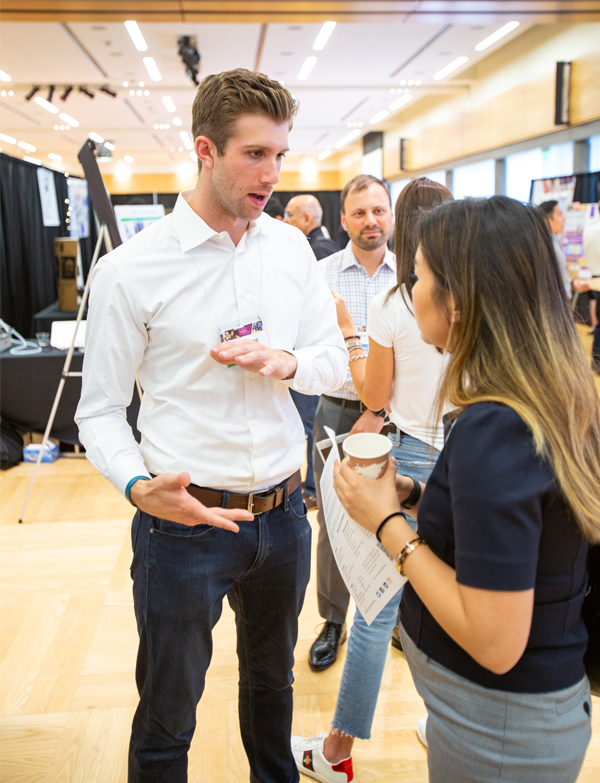 As Andrew sees it, “At the end of the day—if I’m going to start a company, no matter what my specific role is—I’m a professional leader. The ability to recruit and lead your team members is the indicating factor of your success.” He would know. DuJour has grown from a solo show to a team including a Lead Developer (“and Co-Founder of sorts”), various freelancers, and a board of three industry advisors in the past year. The journey to an increasingly sustained business did not come without challenges, though. Andrew had a big momentum-builder in starting DuJour during the customer discovery process, in which he was able to sit down with Seattle restaurant titans Ethan Stowell, Tom Douglas, and Kurt Dammeier. These conversations ultimately gave him the confidence to pursue an on-demand labor service. A great success—but then, the first failure came. After initially launching, his on-demand strategy proved ineffective when about 50% of the workers didn’t show up for their scheduled shifts with restaurants. It became obvious that accountability within the restaurant industry was an issue in need of addressing. “That was a failure and a really important one,” says Andrew. “It led me to what we are doing now: designing a system for automating the reference-checking process that will be built into a full-time hiring model.” With this necessary tribulation, the support of the program, and employment of pure grit, Andrew was well on his way to maintaining a viable venture. Navigating Post-Graduation Life Since graduating, Andrew notes that his anxiety levels have risen, but for good reason. He’s putting in the work and making big headway. Earlier this summer DuJour launched their first software, which was a milestone. Their partnership network continues to grow, with support from prolific Seattle restauranteurs on the horizon. Not to mention, he’s becoming more comfortable with being his own boss and setting his own hours, which is a mountain in and of itself. Three Questions on Entrepreneurship What is an entrepreneur in your eyes? “An entrepreneur is someone who constantly recognizes gaps and is able to draw bridges across those gaps with whatever tools they have. For some people that is software…for others that is team building and constructive problem-solving. But an entrepreneur is someone who—money aside—is interested in solving problems.” What are the advantages of entrepreneurship versus a more traditional career path? “Our general schema of society right now is very focused on outcome-oriented and short-term pleasure, and what you can display on Instagram about your life. I think that entrepreneurship, as a young person particularly, helps you focus on a growth mindset and being unafraid of failure—seeking failure, even. And I think that’s a particularly good quality of an entrepreneur: someone who kind of revels in failure and isn’t necessarily afraid of it. If you’re a young person that is considering what to do and you don’t have any hardcore financial restrictions (i.e. a family, a house)…there’s no better way to learn critical life and business skills than just throwing yourself in there an doing it.” What is your advice for first-time entrepreneurs struggling with self-doubt? “Self-doubt is a constant battle that every entrepreneur—even Elon Musk—has. Because we’re all comparative beings, we all look at what our ‘tribe’ is doing and want to fit in. I’m a very methodical person, so the way I kind of limit that anxiety is by just constantly having my eyes set on: ‘what are the core assumptions I’m making right now about this idea and how do I get those addressed, to calm my nerves?’ A big thing for me is I always make sure that I’m heavily convicted but lightly held. I have a hypothesis. And, as an entrepreneur you’re just basically a business scientist—you’re experimenting—so you must be convicted about something. You have to be dedicated to what you think, but as soon as you have critical evidence that it’s not true, you’re an idiot if you stay stubbornly on that path.” We’re Dying to Know… Favorite app? Fitmind—basically it’s a new twist on a meditation app, and Fitmind is a company that my friend Liam started, with the goal of modernizing meditation for our society and making it accessible as a practice but being both process and results oriented at the same time. Most likely place to be brainstorming new hypotheses? Most of it comes to me when I’m not trying. In my workplace I’m inherently trying. So, in my bed, in the car. Really good ideas are created when you’re alone, bad ideas are weeded out when you’re together. Finish this sentence: My workspace is not complete without… An indoor plant. Best medium to get your entrepreneurial news fix? Techcrunch, How I built This, The Pitch. Must-follow person on the internet? Gary Vaynerchuk. What section do you gravitate towards in the bookstore? I don’t want to say self-help because that sounds weird. But I like reading stuff where I can read a small bit and then go act on it. So yeah, self-help, you can put that in there. Learn more about the Master of Science in Entrepreneurship program
|
| FROM Foster Admissions Blog: Once an Entrepreneur, Always an Entrepreneur: How Master of Science in Entrepreneurship Alum Andrew Jung came to Found DuJour and GrillMe |
Andrew Jung is the Co-Founder of the on-demand turned full-time hiring restaurant labor platform DuJour. An alumnus (’19) of the Master of Science in Entrepreneurship program, we recently got the chance to catch up with Andrew on a sunny day at his co-working space in Columbia Tower Club. We discussed how he first landed on the entrepreneurial path, his deviation from the “normal” working world, and how the MS in Entrepreneurship program played a key role in the launch of his second company, DuJour. A Sick Spell with an Unlikely Outcome Andrew Jung never intended to enter the foodservice startup business—but then again, he also never intended to contract mononucleosis (“mono”) during his senior year of college. It was this opportune malady that jumpstarted Andrew’s career in entrepreneurship. Any young adult afflicted with the misfortune of enduring mono knows that leaving the confines of a bed, much less leaving one’s living quarters to get food, is a near-impossible task. When Andrew found himself in this situation, he refused to let it stop him. Reframing this circumstance as a potential opening for a business venture, he decided to create a food delivery service app (now named GrillMe) that would allow him to virtually order his favorite fare and have it delivered to the entrance of his dorm room. The Return to Entrepreneurial Roots After graduating from Middlebury College with a dual degree in Economics and Computer Science in 2016, Andrew made the transition into a seemingly ideal job as a Financial Analyst at J.P. Morgan, which he had lined up prior to leaving his undergraduate studies. Almost two years went by before Andrew realized it wasn’t the right place for him. He soon learned of the newly introduced MS in Entrepreneurship program and was intrigued. The entrepreneurial spark that had started in college was still alive, leading him to think this could be a great opportunity to dive all-in to entrepreneurship and grow his budding business skills. So, Andrew decided to go for it. His college side-hustle, GrillMe, was (and still is, but under different ownership) going strong, but he didn’t necessarily look at the Entrepreneurship program as solely a tool to grow the company. In fact, between the time he had applied to and started the MS in Entrepreneurship in summer of 2018, Andrew had an entirely new idea. He steadily turned the prospect into DuJour, ultimately deciding to sell GrillMe during this period. Today, Andrew can be found high up in the handsome working quarters of the iconic Seattle high rise, where he leads operations of the restaurant service and labor-matching company he founded in August of 2018, called DuJour, Inc.  DuJour is an evolving labor-matching platform which currently serves as a liaison between local restaurants seeking labor and food service workers seeking employment. After learning more about the intricacies of the foodservice industry through founding GrillMe, Andrew discovered that he wanted to explore another opportunity for improvement within this space. “Employment and workforce issues are a lot more interesting to me because it presents a much bigger problem to restaurants,” he said, reflecting on how the ever-growing restaurant industry is going to have an increasingly larger role in society as people come to lead busier and busier lives. Leading as an MS in Entrepreneurship Student Andrew says the MS in Entrepreneurship was not only instrumental in teaching him technical business skills, like pitching an idea and go-to-market strategies, but also in maintaining a necessary amount of accountability and community. He found the support systems and leadership-strengthening opportunities embedded within the program to be particularly impactful. Ken Myer, who teaches Entrepreneurial Leadership among other classes in the Foster School, became a close mentor to Andrew. “I really like the [Entrepreneurial Leadership] course and Ken was spectacular at teaching it,” Andrew says. “I would call him all the time and ask for advice on what I was doing in the real world.” Learning to effectively lead was important for Andrew because he believes this skill is a highly underestimated ability that many see as a “soft-skill” or something that you can just wing. However, he was also inspired by the leadership reflected in students comprising his cohort, an attribute which he really valued within the MS in Entrepreneurship.  As Andrew sees it, “At the end of the day—if I’m going to start a company, no matter what my specific role is—I’m a professional leader. The ability to recruit and lead your team members is the indicating factor of your success.” He would know. DuJour has grown from a solo show to a team including a Lead Developer (“and Co-Founder of sorts”), various freelancers, and a board of three industry advisors in the past year. The journey to an increasingly sustained business did not come without challenges, though. Andrew had a big momentum-builder in starting DuJour during the customer discovery process, in which he was able to sit down with Seattle restaurant titans Ethan Stowell, Tom Douglas, and Kurt Dammeier. These conversations ultimately gave him the confidence to pursue an on-demand labor service. A great success—but then, the first failure came. After initially launching, his on-demand strategy proved ineffective when about 50% of the workers didn’t show up for their scheduled shifts with restaurants. It became obvious that accountability within the restaurant industry was an issue in need of addressing. “That was a failure and a really important one,” says Andrew. “It led me to what we are doing now: designing a system for automating the reference-checking process that will be built into a full-time hiring model.” With this necessary tribulation, the support of the program, and employment of pure grit, Andrew was well on his way to maintaining a viable venture. Navigating Post-Graduation Life Since graduating, Andrew notes that his anxiety levels have risen, but for good reason. He’s putting in the work and making big headway. Earlier this summer DuJour launched their first software, which was a milestone. Their partnership network continues to grow, with support from prolific Seattle restauranteurs on the horizon. Not to mention, he’s becoming more comfortable with being his own boss and setting his own hours, which is a mountain in and of itself. Three Questions on Entrepreneurship What is an entrepreneur in your eyes? “An entrepreneur is someone who constantly recognizes gaps and is able to draw bridges across those gaps with whatever tools they have. For some people that is software…for others that is team building and constructive problem-solving. But an entrepreneur is someone who—money aside—is interested in solving problems.” What are the advantages of entrepreneurship versus a more traditional career path? “Our general schema of society right now is very focused on outcome-oriented and short-term pleasure, and what you can display on Instagram about your life. I think that entrepreneurship, as a young person particularly, helps you focus on a growth mindset and being unafraid of failure—seeking failure, even. And I think that’s a particularly good quality of an entrepreneur: someone who kind of revels in failure and isn’t necessarily afraid of it. If you’re a young person that is considering what to do and you don’t have any hardcore financial restrictions (i.e. a family, a house)…there’s no better way to learn critical life and business skills than just throwing yourself in there an doing it.” What is your advice for first-time entrepreneurs struggling with self-doubt? “Self-doubt is a constant battle that every entrepreneur—even Elon Musk—has. Because we’re all comparative beings, we all look at what our ‘tribe’ is doing and want to fit in. I’m a very methodical person, so the way I kind of limit that anxiety is by just constantly having my eyes set on: ‘what are the core assumptions I’m making right now about this idea and how do I get those addressed, to calm my nerves?’ A big thing for me is I always make sure that I’m heavily convicted but lightly held. I have a hypothesis. And, as an entrepreneur you’re just basically a business scientist—you’re experimenting—so you must be convicted about something. You have to be dedicated to what you think, but as soon as you have critical evidence that it’s not true, you’re an idiot if you stay stubbornly on that path.” We’re Dying to Know… Favorite app? Fitmind—basically it’s a new twist on a meditation app, and Fitmind is a company that my friend Liam started, with the goal of modernizing meditation for our society and making it accessible as a practice but being both process and results oriented at the same time. Most likely place to be brainstorming new hypotheses? Most of it comes to me when I’m not trying. In my workplace I’m inherently trying. So, in my bed, in the car. Really good ideas are created when you’re alone, bad ideas are weeded out when you’re together. Finish this sentence: My workspace is not complete without… An indoor plant. Best medium to get your entrepreneurial news fix? Techcrunch, How I built This, The Pitch. Must-follow person on the internet? Gary Vaynerchuk. What section do you gravitate towards in the bookstore? I don’t want to say self-help because that sounds weird. But I like reading stuff where I can read a small bit and then go act on it. So yeah, self-help, you can put that in there. Learn more about the Master of Science in Entrepreneurship program
|
| FROM Foster Admissions Blog: Announcing 2020 MBA Study Abroad Programs! |
|
The Global Business Center will offer several short-term study abroad options for MBA students in March and June of 2020. Learn more below, or attend one of the following info sessions: Study Tour Info Sessions: October 7, 12:30 -1:20 , Paccar 292 October 7, 5:00-5:50, Paccar 393 India Consulting Project Info Sessions: October 9th, 12:30-1:20, Paccar 294 October 9th, 5:30-5:55, Paccar 390 Can’t make it to an info session? Recordings will be available after each event. 2020 STUDY TOUR DESTINATIONS:  Estonia and Finland Faculty Leader: Masha Shunko Price: $3100 plus airfare Dates: March 15 – March 26*  South Africa Faculty Leader: Shaosong Ou Price: $3100 plus airfare Dates: March 15 – March 27* *DATES DO NOT INCLUDE TRAVEL DAYS Curious what a study tour is like? Read MBA blog posts about previous study tours: Rohan Sebastian – China/Taiwan Holly Ostrom – Israel STUDY ABROAD LINKED TO A COURSE:  ACM Course and Study Tour Flyer 2020 *1st & 2nd Year EveMBAs not eligible due to Winter quarter core class schedule Asian Capital Markets Study Tour to Shanghai, Nanjing and Tokyo. Further enhance your understanding of investing in Asia through in-country meetings with investors, local financial institutions, and government officials.
 India Consulting Project 2020 Flyer India Consulting Project 2020 FlyerRead a blog post from previous MBAs that participated in this program: Yun Lu and Ashton Reddy India Global Consulting Projects Sightseeing in Delhi, Agra and Jaipur. Project work with SEWA in Ahmedabad, India.
 London/Dublin Study Tour & Summer Seminar Flyer *The timing of this June Study Tour will likely conflict with Full Time MBA internship schedules. Graduating MBA students are not eligible due to the required summer quarter class. London/Dublin Study Tour and Graduate Seminar International experience followed by an on-campus seminar to explore insights discovered abroad.
For more information on applications, deadlines and details visit: https://foster.uw.edu/centers/gbc/mba-programs/short-term-programs-abroad/ Additional Questions? Contact Josie Kraft at the Global Business Center jgkraft@uw.edu The post Announcing 2020 MBA Study Abroad Programs! appeared first on Foster Blog. |
| FROM Foster Admissions Blog: Summer Fellowship Programs Offer Unrivaled Experience |
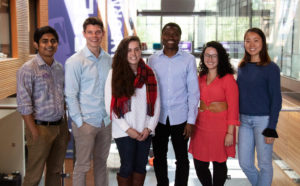 Six graduate students at the University of Washington wanted a challenge. They received that and more in two Summer Fellowship programs offered by, or in partnership with the Foster School’s Buerk Center for Entrepreneurship. The six fellows contributed to six different projects with real promise, including new medical devices, tools for improved patient experience, and a system for more efficient healthcare management. Three of the summer fellows tackled technology-based projects as part of the ITHS/WRF Summer Commercialization Fellow Program. The program was originally conceived with funding from the Washington Research Foundation (WRF) twenty years ago before joining forces with the Institute for Translational Health Sciences (ITHS) as a partner in 2012. Together, the program has empowered MBA and graduate students to deliver solid business assessment input on projects out of research labs at the University of Washington, the Fred Hutchinson Cancer Research Center, and Seattle Children’s. That input has helped support critical commercialization development decisions as the principle investigators push their ideas forward. This year an exciting twist was added to the summer fellow experience with the addition of the Population Health Social Entrepreneurship Fellowship and three fellows to the cohort. They focused on projects that had technology or services aimed at addressing challenging issues like mental health, substance abuse risk, and access to supportive professional services. Saswata Dey, a Foster School MBA candidate from India, came on board as one of the new Social Entrepreneurship Fellows and walked away learning a lot about the U.S. healthcare system. He worked on FOCUS—an app that has interactive tools built into it to help patients manage different facets of their care, especially for mental health. In the future he hopes to apply what he learned, including aspects of the complicated decision-making and regulations of the U.S. system, to improve care in his home country where there is a serious shortage of medical providers. The other five fellows shared the same idea of making a difference long-term with their projects. Commercialization fellow Jake Nazarian worked on a technology that aims to measure blood volume for patients in potential need of transfusions. His approach involved talking to a number of physicians in different hospitals and care situations. Much to his surprise, many were not particularly excited about the technology, mainly because they didn’t see it changing the care approach they would take anyway. That forced him to dig deeper into who might have a big need for the kind of measurement this technology was meant to deliver. Channeling his experience as an emergency medical technician, Jake found physicians in specific care situations interested in using the blood volume measurements to support their care decisions, leading to a clearer focus for the technology. MBA student Vivian Wei also found herself adjusting her understanding of the potential application of a technology on the commercialization side. Her project was a software system developed to help optimize management of operating rooms in the hospital. While the system is proving useful within the group that developed it, Vivian discovered that a wide-scale launch wouldn’t be advisable without the team gathering more data on both the value of the system as a tool and its potential return-on-investment. Fred Yeboah, a PhD student in Molecular and Cellular Biology, worked on a commercialization project aimed at improving the process doctors use to keep a healthy microbiome in their patients during chemotherapy or antibiotic treatment. This project really spoke to Fred because of his interest in the interface of science and business. However, he learned quickly that gathering potential customer input is not that easy, especially when those customers are busy doctors. However, social entrepreneurship fellow Elizabeth Esborn found it easier to gather information from academic professionals. The Master’s in Public Health student worked on a project called EMAR, which explores the potential of social robots in supporting kids in a school setting. Elizabeth was able to learn key information about how schools make decisions about new programs and technologies and how they are implemented practically and financially. This information will be valuable as the UW investigators think about schools as their primary customers. Exploring the business side of making non-profits viable drew our final social entrepreneurship fellow Karissa Masciel to her project. As a sociology student, she gathered a unique perspective alongside Communities that Care, as they explored directions team leadership could take to expand their services. “It was (really) cool,” she said. “I now have this new lens I can look through at things.” Each of the summer fellows worked independently, yet closely with their technical teams and as a cohort. They shared insights, contacts, and specific knowledge-based information with each other, making for a very rich experience. Past fellows have used these experiences to take on roles in innovation management, business development, and management consulting. Some, like MBA graduate Logan Jacobs, went on to become CEO of the spinout from his summer fellow project. His company, Tournitek, graduated from the Jones + Foster Accelerator and has ramped up developing and fundraising around its solution to fighting limb amputations from serious injuries. Sabrina Kamran, a PhD student in Pharmacology and a Foster School Technology Entrepreneurship Certificate student, is now working as a business development manager at a biotech startup in Boston. Prathamesh Bagade, who helped a researcher at Seattle Children’s during his summer fellowship, is now employed as a product innovation manager at Fluke Corporation in Everett. Other examples of past fellows and their career paths include Tim Everson who is a consultant at PWC and Shivani Gupta who is an innovation development officer at Xinova in Seattle. These are just some of the examples of how the fellowships have proved instrumental in helping students explore new areas of work and develop useful skills sets that don’t just add to a graduate student’s academic career, but a lifetime of work. To learn more about the summer fellowship programs, head to startup.uw.edu. The post Summer Fellowship Programs Offer Unrivaled Experience appeared first on Foster Blog. |
| FROM Foster Admissions Blog: Inside the Accelerator: The McAleer Early Start Fund |
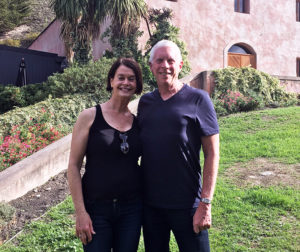 When you’re an early-stage startup, particularly a student one, one thing can make a difference between success and failure: runway. The earlier the startup, typically the less cash on hand. Certainly, that is the case for many teams in the Jones + Foster Accelerator at the Foster School’s Buerk Center for Entrepreneurship. That’s why Voyager Capital partner Bill McAleer and his wife Colleen are such difference makers. They decided to make a gift to the program to help J+FA teams with early expenses. “We agreed that $1,000 should be a seed resource for each company and we funded it in a way where each cohort gets access,” said McAleer. “It helps with some of the basic expenses to get the company incorporated, and maybe to secure hosting services. These companies need seed money to off the ground and hopefully it’s helping to make a difference.” Colleen is a MBA graduate of the University of Washington, while Bill earned his MBA at Cornell University. They first got involved with the Buerk Center after Bill co-founded the venture capital firm Voyager, which focuses on early stage investments in emerging tech companies. “Colleen is an entrepreneur and had her own business for about 27 years,” said McAleer. “And we had made a sizable donation to the computer science school already. But we also wanted to help Buerk Center students.” 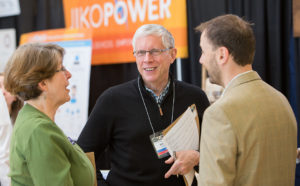 Bill first connected with former Buerk Center director Connie Bourassa-Shaw (who was second in-charge in the Center at the time) and became an early sponsor and judge in the UW Business Plan Competition (now Dempsey Startup Competition). That quickly turned into a position on the Advisory Board for the Center, including a decade of serving in the role of Board Chairman. Not only would he play a critical role in advising then Dean Jim Jiambalvo to appoint Connie as director, but he was part of the team that helped form the basis for an Accelerator. “One of the things we recognized was that there were great ideas coming out of the business plan competition, but they needed some more help and mentoring and connections and money,” said McAleer. “We did some work trying to figure out how we could help coach these promising teams and devised a cohort program. Fortunately, (the Accelerator) was funded by the Herbert B. Jones Foundation (and others) and this whole incubation idea got off the ground.” Now McAleer balances his active role as partner at Voyager with continued work on the Advisory Board and coaching students involved in starting company ideas. In this way, McAleer gets a chance to share lessons learned over 30 years of senior executive and investment experience. “I always tell our entrepreneurs that if you’re tight on money, the easiest source of money for you is your customers. Use customer money to grow your business if you can and use capital to scale your business.” When it comes to students, the message is even more straightforward. “I think the biggest lesson I try to talk to the students about is the importance of understanding what your passion is. If you want to be an entrepreneur, that’s great. If you don’t want to be an entrepreneur, you can be very successful as well.” Bill certainly has found success as a venture capitalist and continues to be actively involved in entrepreneurial activities across the Pacific Northwest. At Voyager, they recently launched their fifth $100 million fund targeting B2B tech startups based in the Pacific Northwest. “I think what keeps the spark going is helping entrepreneurs to grow their ideas and working with founders who are passionate about making a difference,” said McAleer. “I would tell anyone who has a good idea to go pursue it. And then, surround yourself with good people and make it happen.” Bill McAleer and Voyager Capital have been one of the valued sponsors of the UW Business Plan Competition (now Dempsey Startup Competition) since 2001. Colleen McAleer serves annually as a judge in the Alaska Airlines Environmental Innovation Challenge, adding that she feels “students will lead the way in climate change solutions, and our support is a tangible way to make that happen.” The post Inside the Accelerator: The McAleer Early Start Fund appeared first on Foster Blog. |
| FROM Foster Admissions Blog: Inside the Accelerator: The Jones Foundation |
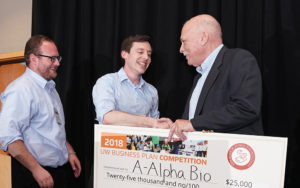 Michael Bauer is a tall man with a wide, infectious smile, and a huge capacity for giving. As the senior member of the board of the Herbert B. Jones Foundation, he helps decide where large grants of money will go to support small business entrepreneurship education. That includes more than a decade of investing in programs like the Jones + Foster Accelerator at the UW Foster School’s Buerk Center for Entrepreneurship. In fact, you could say nothing Michael Bauer does is small. Except when it comes to the spotlight. “It’s not about me. It’s not the foundation. It’s Herb,” Bauer says. “He had the foresight. He was a smart person who recognized this void with small business and entrepreneurship.” To appreciate the role the Jones Foundation plays in programs like the Accelerator, you must understand how deeply committed Bauer and the trustees remain to their friend and client. Twenty-five years before they met, Jones found success with an office machine business after serving in World War II. The foundation website features an in-depth retrospective on those early days, chocked full of anecdotes related to sales, customer experience, and investment—punctuated by Jones’ trademark kindness. In it, Bauer describes Herb as “the only person I ever met who really never said anything negative about somebody else.” 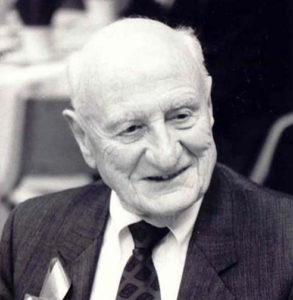 As for the foundation itself, a CliffsNotes of how it came into being might read as follows: Upon retiring in 1971, Herb met Michael Bauer, a trust officer at what eventually became Bank of America. The two worked together on his estate planning and quickly became friends. The plan for Herb’s trust shifted towards philanthropy after the death of his wife Alice in 1981. Seeking a long-term outlet for his wealth, Bauer introduced Herb into the world of higher education. “Herb didn’t get to fulfill much of his desire for education because of the war and so on,” Bauer says. “But he recognized that education provides for people to be entrepreneurs and create small businesses. It was an effective use of his money.” Herb, in his 80s, began his first endowment program with Seattle University through his newly established foundation. “When we started getting into it, no one really had any programs,” Bauer says. Fast-forward more than a decade later and the foundation connected with former Buerk Center director Connie Bourassa-Shaw and the Foster School of Business. “With Connie, that was the first time we really dealt with a committed program that was expanding, had solid leadership, and a strong network that would impact large numbers of students.” 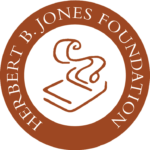 The year was 1998. Herbert B. Jones would pass away on Easter Sunday. The board, led by Bauer, was now in the position of maintaining their departed friend’s trust and expanding its reach, if necessary. Each funding request was to be given “careful consideration to make sure it was keeping with Herb’s philosophy of encouraging self-improvement.” Among those, support for the first of what would become an annual business plan competition at the University of Washington. Success, as they say, begets success, and soon it would be time to support another kind of program—something new and innovative. “When we started talking about launching an accelerator for student teams in 2009, the foundation was enthusiastic,” says Bourassa-Shaw. “They realized, as did we, that the student startup process doesn’t end with the competition—that’s when the real work begins!” Bauer admits they had a lot of options before choosing to fund the Accelerator, but looking back, he wouldn’t change a thing. He says its “invigorating” to watch how the program has grown in the ten years since they first funded it. “We’re in the real world of trying to make these ventures continue and trying to give them an element of assistance to make their road a little bit faster or easier,” Bauer says. “When we laid the original grant, we said we wanted it available to other schools, which is probably the best thing that happened, because it regionalized it to across the state of Washington.” Still, for Bauer it’s about the core principles of being an entrepreneur, of running a small business and working with other businesses in the community, the way Herb did it all those years ago. “One entrepreneur relates to another. They start seeing what other people are doing, and they aren’t just competing against the same people they are in class with,” Bauer says. “Sometimes it’s being at the right place at the right time. That’s why you build up all the education, learning, and networking resources that you can.” 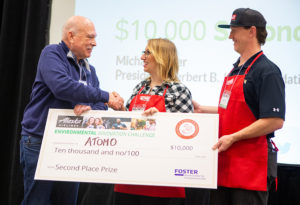 “Most students might recognize Michael as the familiar face in competition photos, handing over a giant check to winning teams,” says Buerk Center director Amy Sallin, “but his support, and the support of each board member at the Jones Foundation, has been absolutely critical to the Center and student entrepreneurship. We celebrate Michael for being every bit the equal of Herbert in terms of passion and impact.” Bauer acknowledges that today, the Herbert B. Jones Foundation is less recognized for the man behind the name, then the impact it has. He jokes that someday that will “happen with Bill Gates (and his wife) and their foundation too.” But you’d be hard-pressed to find someone who is more proud of being a caretaker for a friend’s legacy. “I’ve gotten to be the transition point for something that Herb recognized, a small idea that got much larger,” Bauer says. “Did we ever think it would reach the level of what we’ve got now? No. We just thought it would be effective, like giving out scholarships. Instead, we’ve been able to add, and take care of programs to affect students.” Now that’s what you would call doing something big. The Herbert B. Jones Foundation supports programs across the state of Washington, at schools including but not limited to the University of Washington, Seattle University, Washington State University, Seattle Pacific University, Pacific Lutheran University, Central Washington University, and a consortium of colleges and universities in and around the Spokane region. In addition to the generous support of the Accelerator, the Jones Foundation is also an annual sponsor of the Dempsey Startup Competition (formerly the UW Business Plan Competition), the Alaska Airlines Environmental Innovation Challenge, and the Hollomon Health Innovation Challenge. The post Inside the Accelerator: The Jones Foundation appeared first on Foster Blog. |
| FROM Foster Admissions Blog: Avolio ranked #2 most influential researcher in leadership, #3 in organizational behavior |
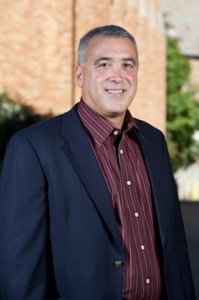 Bruce Avolio Two new studies establish Bruce Avolio, a professor of management at the University of Washington Foster School of Business, as one of the world’s foremost leaders in the study of leadership and organizational behavior. A paper in the August 2019 issue of The Leadership Quarterly ranks Avolio the #1 scholar in the world at connecting authors in the field of leadership research, and #2 in productivity and influence of his leadership studies. A separate article, published earlier this year in the journal Academy of Management Learning and Education, lists Avolio the #3 most influential author—of all time—in the field of organizational behavior. Avolio is the Mark Pigott Chair in Business Strategic Leadership and founding executive director of the Center for Leadership and Strategic Thinking at the Foster School. Output and impact The Leadership Quarterly study—“A Computerized Approach to Understanding Leadership Research”—considered the full range of leadership topics published in academic journals over the past three decades. The authors audited 2,115 leadership articles by 3,190 researchers published in 10 leading academic journals since 1990. Productivity was measured by the number of published papers by each researcher over this period; influence by the number of paper citations in other publications. In terms of both output and impact of leadership research, Avolio emerged at #2 in the world over the past three decades. The study also mapped networks of connectivity between scholars in various areas of leadership research. Avolio appeared at the center of everything, the most active hub of activity in the field. He rated #1 in “betweenness centrality,” the authors’ term for connecting otherwise unrelated authors. And he ranked #2 in “degree centrality,” or the total number of co-author collaborations. Outstanding in OB (and other fields) The article establishing Avolio as the #3 most influential scholarin organizational behavior arrived at this conclusion by measuring the number of citations in leading OB textbooks of more than 16,000 researchers who were cited at least once. Avolio also was ranked the #30 most-cited author in general management textbooks. 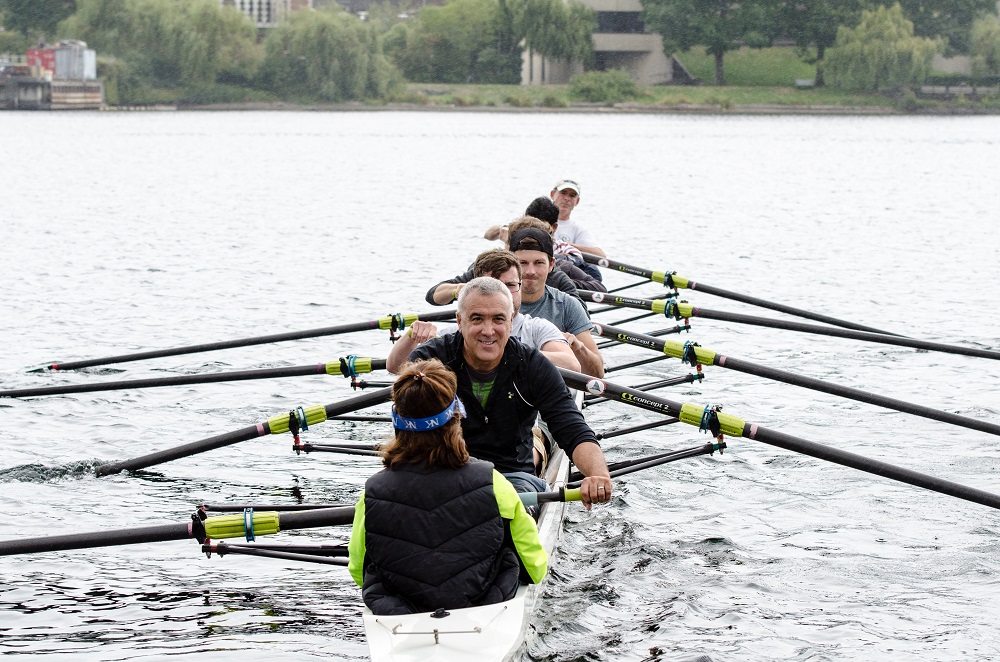 Previously, a 2017 a study in the journal Industrial and Organizational Psychology named Avolio the #22 most-cited researcher of the past 100 years in the field of industrial and organizational psychology (out of more than 8,000 cited scholars). And in 2016, Thompson Reuters recognized him among the 3,000 most influential researchers in the world across all of the sciences. Prolific and profound Avolio, the author of more than 150 published articles and 12 books, is recognized as one of the world’s foremost authorities on transformational and authentic leadership. He has worked directly with a variety of global businesses and organizations—in healthcare, financial services, entrepreneurship and the military, among others—to help them develop authentic leadership and achieve their missions. Avolio’s long list of academic honors includes the 2013 Eminent Leadership Scholar Award from the Network of Leadership Scholars in the Academy of Management, and fellowships in the Academy of Management, the American Psychological Society, the American Psychological Association and the Society for Industrial & Organizational Psychology, among others. In 2008, Avolio was named among the world’s 150 most influential management scholars in the Journal of Management (along with fellow Foster faculty Terence Mitchell, professor emeritus of management, and Charles Hill, the Hughes M. and Katherine G. Blake Endowed Professor in Business Administration). The post Avolio ranked #2 most influential researcher in leadership, #3 in organizational behavior appeared first on Foster Blog. |

|
|
||
|
Hi Generic [Bot],
Here are updates for you:
ANNOUNCEMENTS
Watch earlier episodes of DI series below EP1: 6 Hardest Two-Part Analysis Questions EP2: 5 Hardest Graphical Interpretation Questions
Tuck at Dartmouth
|